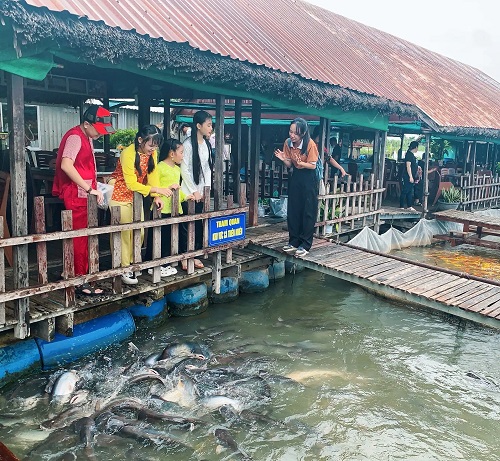
Changing the method of creating tourism products
Can Tho has a total agricultural land area of 114,034 hectares. This includes approximately 76,000 hectares for rice production, around 25,000 hectares for fruit tree cultivation (with 11,880 hectares specialized for this purpose), and about 10,000 hectares for aquaculture. These resources provide Can Tho with great potential and advantages for developing eco-tourism.
In Can Tho, numerous eco-tourism gardens are spread across districts, with a concentration in Phong Dien, Binh Thuy, and Cai Rang. These gardens offer local specialty fruits such as Ha Chau Burmese grapes, mangosteens, and durians. Some gardens have also expanded to plant new varieties of plants to attract tourists. For instance, Nhat Tam Farm vineyard, located on Dinh Cong Chanh Street, Long Hoa Ward, Binh Thuy district, is well-known for its peony grape variety. Mr. Nguyen Ba Duy, the owner of Nhat Tam Farm vineyard, mentioned that the vineyard currently has 700-800 peony grape trees and other grape varieties, such as seedless black finger grapes and Ninh Thuan grapes. He is also expanding the garden and adding more services to cater to visitors' needs.
In the past, eco-gardens in Can Tho were often seen as small and unexciting because they only offered a few typical activities, such as fruit picking and enjoying local dishes. However, some places have expanded their offerings to provide various experiences in recent years. One example is the Can Tho Eco Resort in Nhon Nghia commune, Phong Dien district. Covering an area of 20 hectares, the resort offers a range of experiences, including garden tours, relaxation, and entertainment as part of the ecological complex, which includes Eco Farm, Eco Wonderland, and Eco Safari. Ms. Le Hong Cam, the CEO of Can Tho Eco Resort, stated that the resort is committed to developing an ecological and sustainable agricultural model focusing on preserving natural spaces and indigenous cultural elements.
Some destinations are moving towards sustainable tourism by offering deep and immersive experiences. For instance, the Mekong Silt Ecolodge in My Khanh commune, Phong Dien district, adopts a circular eco-tourism model. Ms. Huynh Thi Bich Tuyen, the owner of Mekong Silt Ecolodge, emphasized the importance of protecting resources while offering sustainable eco-tourism experiences. Visitors to the lodge can participate in craft village workshops and learn about repurposing waste to create products like soap, dishwashing liquid, and floor cleaners.
Eco-tourism offerings in Can Tho now encompass a wide range of options, from visiting individual fruit gardens to experiencing eco-resorts, from traditional agricultural gardens to high-tech applications, and in-depth experiences by topic to cater to tourists' diverse needs.
Orientation for developing eco-tourism
Can Tho identify eco-tourism as one of its strengths and actively develop strategies and investment programs to support this type of tourism? Each district of Can Tho City has specific development plans in place. For example, Phong Dien plans to develop eco-tourism by allocating areas for agricultural development alongside eco-tourism, resort areas linked with garden picnics, concentrated vegetable growing areas, and visits to flower and ornamental plant villages. There are also plans to develop eco-tourism on islets and islands such as Tan Loc island (Thot Not) and Son islet (Binh Thuy). The city's Tourism Department regularly organizes trips to learn from successful models and practices in other localities like Dong Nai, Lam Dong, and Tay Ninh. These trips provide opportunities for business owners in the tourism and agricultural sectors to gain insights into various eco-tourism and farming models. The selected models prioritize organic, green, and natural agriculture and emphasize the combination of agriculture with the development of diverse tourism products and services.
Resolution No. 59-NQ/TW, dated August 5, 2020, of the Politburo on the construction and development of Can Tho City until 2030, with a vision towards 2045, aims to shape Can Tho as an ecological, civilized, and modern city that reflects the identity of the Mekong Delta. In the long-term tourism development plan, Can Tho aims to highlight the river's identity while integrating green and sustainable development trends in national and international tourism. To achieve this, Can Tho has initiated projects such as "Developing agricultural tourism in Can Tho City from 2021 to 2025, with a vision towards 2030" and "Developing tourism in Can Tho City with an ecological focus, incorporating the region's cultural values from 2025 to 2030, with a vision towards 2035." In addition to planning and investing in eco-tourism areas and attractions, Can Tho is also establishing mechanisms and policies to address challenges and support the development of agricultural tourism. This will contribute to the sustainable creation of a range of city-specific products.
Hoang Dat





